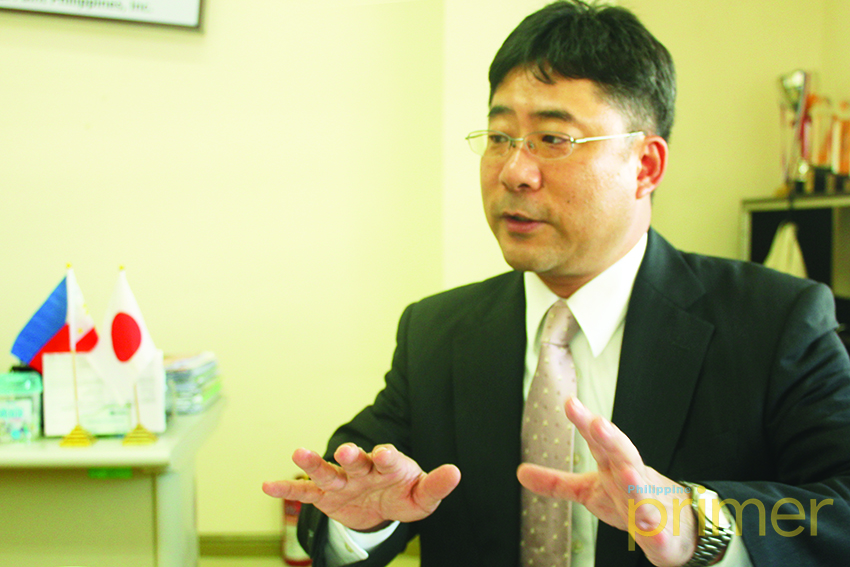Business Talk with Kansai Paint Philippines’ President and GM Takushi Yamamoto
Filipinos deal with mosquitoes almost on a daily basis. We’ve done everything to deal with them, but they just seem to come back for more. Now, Kansai Paint Philippines, Inc. is introducing something new to the market: Anti-mosquito Paint. We talked to Takushi Yamamoto, President and General Manager of Kansai Paint Philippines, Inc. to know more about the product as well as his insights on doing business in the country.

“Anti-mosquito paint” is already well-known in Malaysia, but is largely unknown to Filipinos. How does it work?
Anti-mosquito paint is the kind of paint that repels mosquitoes. They feel like they want to go away from the area where the paint is. It is not designed to kill mosquitoes, rather it drives them away. They won’t like being in the painted area so they will have to go elsewhere to feed.
Did you know that only female mosquitoes take blood? They take the protein and iron found in human blood to make their eggs. This paint contains an ingredient that makes mosquitoes not feel the need to take blood. No blood, less eggs. This cuts their life cycle, reducing their numbers.
We applied it on the walls of our cafeteria, where mosquitoes totally disappeared. The yellow fever mosquito, which is recognized as transmitter of dengue, is mainly active during daytime. We need to apply this paint to areas where a lot of people stay during daytime, such as schools, hospitals and offices.
How is “anti-mosquito paint” selling in the Philippines?
Right now we are going through the licensing procedure. We started off in Malaysia, then Indonesia and Myanmar. Cambodia and Vietnam are in the works as our next market. Hopefully, we will be successful in the Philippine market.
Compared to other countries like Indonesia and Malaysia, people living in the Philippines are more affected by dengue fever. This is why we think that the Philippines needs this paint as soon as possible.
In Indonesia, a total of 72,000 dengue fever cases have been reported, with 641 deaths in 2014. In Malaysia, 212 people died from a total of 76,000 reported cases(from January 2015 to August 2015 data). In the Philippines, a total of 93,000 dengue fever cases have been reported, with 269 deaths linked to dengue fever (from January 2015 to September 2015 data). This is a 23.5% increase from the previous year.
These statistics shows us why “anti-mosquito paint” is needed in the Philippines. Apply this paint to areas that many people stay during daytime, such as schools, hospitals and offoces.
What made you decide to join Kansai Paint?
I wanted to work for a manufacturing company that had a lot of pride in its products – a company that I could be proud of as I became a part of it.
The painting industry is not affected by the economy’s ups and downs because it has always been used on many different materials such as buildings, wood and many more. I felt more positive about Kansai Paint because of this.
How many locations does Kansai Paint have in the world?
We have been selling our products in 52 countries and have 103 locations across the world apart from Japan. One of the 103 locations is in the Philippines.
Along with Anti-mosquito paint, ALES SHIKKUI was also a hit. What other products do you have lined up? What innovative ideas do you have in mind?
I think “environmental hygiene” and “health” will be the next step for improving our environment. People want their living areas to be cleaner and tidier, so antibacterial products would be the one needed.
The demand in paint changes with the economy’s development. The kind of paint that some countries need may not be the same for other countries. In other words, some paints are not required in advanced countries, such as Japan, but could still be required in developing countries. We have been working on manufacturing products that are available for everyone, not to mention that our products should be high in quality and low in price.
How does the Philippines compare as a business market to other countries?
The Philippines has unlimited potential. We have been eyeing the Philippines with big expectations based on its high economic growth rate, higher ratio of young population and a population increase. Actually, Kansai Paint started doing business in the Philippines 18 years ago, selling the paints for bicycles and vehicles which accounted for 80% of the total sales. We felt the need to offer something besides paint for vehicles to expand our market, which is why we started to advance into architectural structure and building field a couple of years ago. This was a big challenge for us. We are excited to do business in a new field in this country which has so much potential.
There have been setbacks. Even though Filipinos are very cooperative, it is difficult to have a long-term vision in this country because the political policy would be changed radically when the president is replaced. Lack of planning from a political standpoint is our main concern.
Have you experienced any difficulties in doing business in the Philippines? How do you handle these problems?
There are strict legal restrictions against chemical products. Since all of our products contain chemical substances, we are having a hard time getting a license to distribute. They point out so many things such as “this substance could be used as a drug” or “this substance could be used as ingredients for explosives.” These reasons are unpredictable for us as a Japanese company. Also, unlicensed packages from Japan or Thailand would be held at customs forever until they are cleared by licensing.
We have forged relationships with experienced workers as well as local experts who have a good knowledge of these problems and have gotten so much information from them.
What is the best thing about having Filipino staff? Have you ever had any difficulties with them?
I think they are very skillful. They can quickly make a precise reference chart for our clients. They are also hard workers.
n the other hand, sometimes a lack of communication causes a problem. I make sure I explain to them precisely when I request a task. It would also be better if they raised their own ideas more and worked spontaneously. Overall, they work quickly while still being excellent at what they do.
What do you think about Japanese who work overseas?
This is my rst time working overseas. Living overseas, I am having a productive life each day. I feel so energetic, much like other energetic and powerful people in the Philippines. I think people who work overseas become so energetic because they are influenced by energetic locals.
What do you think the future holds for you and Kansai Paint?
I feel the significance of participating in a new architecture painting field as part of Kansai Paint. I want to focus on selling these one-of-a-kind paints for Filipinos and hope it will be effective for them.
Also, as a person who is devoted to industry and manufacture, I would like to have our own factory in the Philippines. It is still a dream because we need to increase the demand first. We want to sell our products enough to have to manufacturing them in a local plant. The Philippines’ potential is unlimited; we hope we can handle this wave well.

KANSAI PAINT PHILIPPINES, INC.
Takushi Yamamoto
President & General Manager
He was born on September 18, 1973 in Kawasaki and grew up in Yokohama, Japan. He has worked with Kansai Paint in their Sales & Management department for 20 years. He gained experience in Gunma (5 years), Mie (4 years), and Okayama (5 years). He was promoted and transferred to the Fukuoka branch after returning from their Gunma branch and specializing in industrial paint. He is now on his 20th year with Kansai Paint, starting a new phase in his career here in Manila.
Favorite Book: Shiokari Pass by Ayako Miula
This novel tells the story of Nobuo through a gradual journey of self-discovery and acceptance of the Christian faith, from his childhood in Tokyo to his death in Shiokari Pass in Hokkaido. People tend to focus on how Nobuo sternly lives his life as a Christian, but what about his abandoned fiance? Though she accepts his life, she has been having a hard time getting away from suffering in deep grief for Nobuo as her husband.












